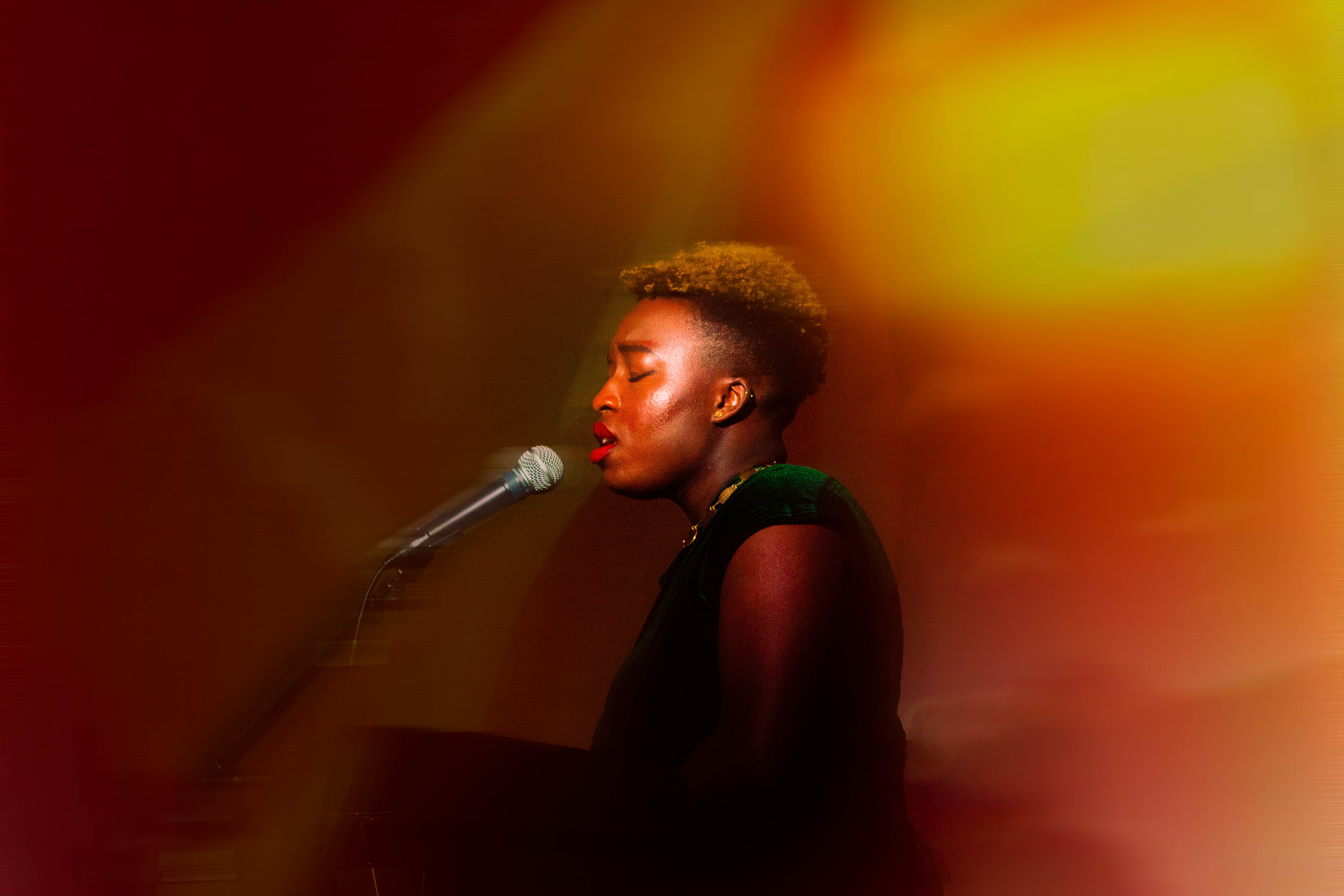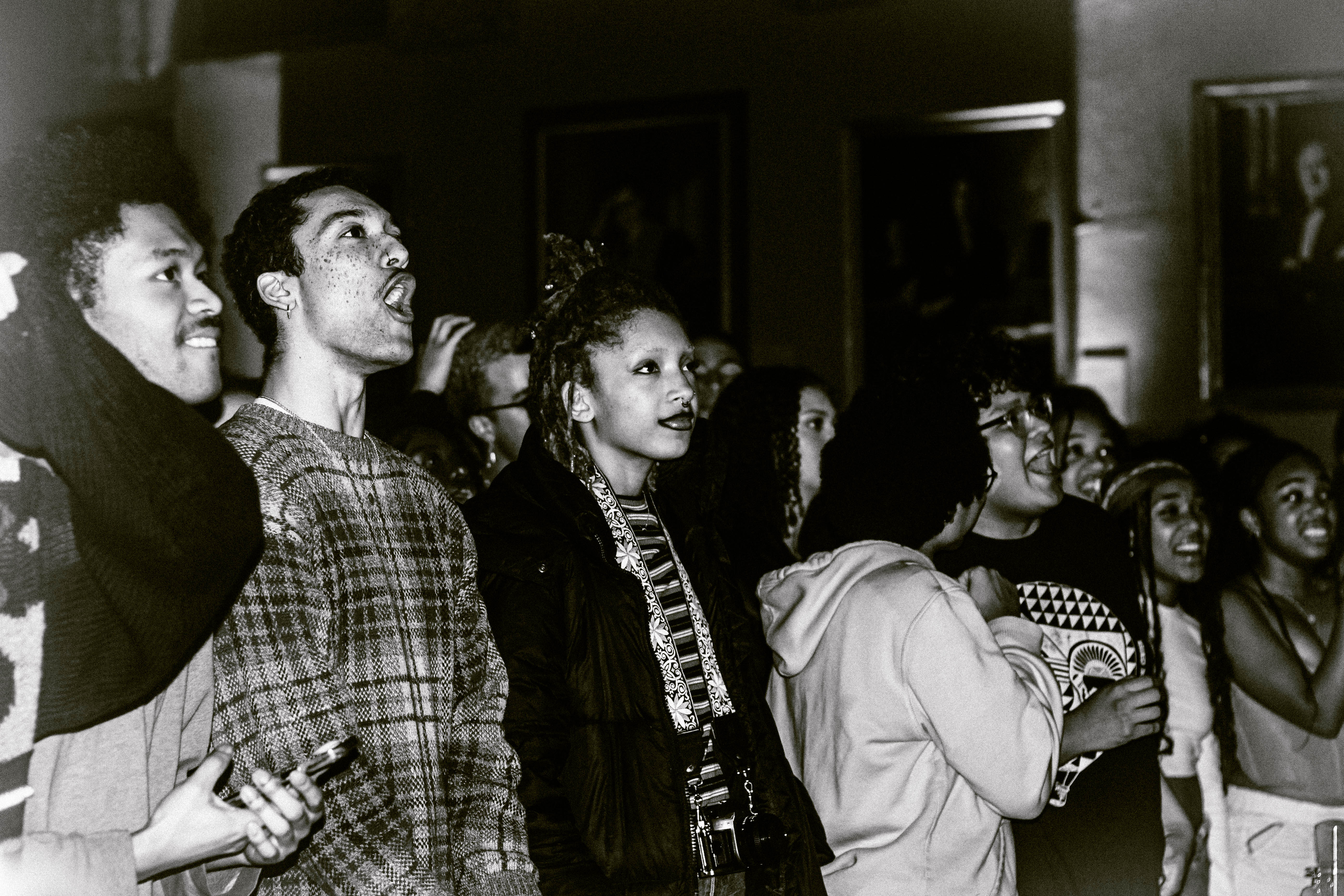Doves, Chief Keef, and My Favorite Color:
Black Student Union at Brown and WBRU 360 Present MAVI

Words: Willow Stewart & Ozzy Wagenseil
April 23, 2023
Each February, the Black Student Union (BSU) at Brown University organizes a concert in celebration of Black History Month—this time, collaborating with the WBRU 360° Experience in Sound for an evening of music, dialogue, and self love.
Previously headlined by artists like Jamila Woods, Megan Thee Stallion, and Providence-based Cape Verdean-American DJ WHERE’S NASTY, rapper MAVI took to this year’s stage ahead of a sold-out show in Paris.
The night began with students and fans mingling and settling into Sayles Hall. As the lights dimmed, members from BSU welcomed the crowd, shared a land acknowledgement, and presented the first performer of the night—student artist Teniola Ayeni, accompanied by a full band, received an immediate roar of applause and geared up for a six-song set. With music performed by students of color primarily for students of color, the annual Black History Month concert fostered a sense of community among the audience, characterized by smooth vocals, resounding drum and bass, and a comforting familiarity. “Sunday Afternoon” was the perfect close to the opening act, concertgoers singing in unison and basking in anticipation.
![]()
Born in 1999 in Charlotte, North Carolina, Omavi Ammu Minder has always had an exciting fascination with words and language. “[He] could tell you [his] favorite words before [he] could tell you [his] favorite color,” and by the time he was a sophomore in high school, he knew he wanted to be a rapper. In 2014, he joined the NC music collective KILLSWITCH and, since the release of his self-produced debut album Let the Sun Talk in 2019, has amassed over three million monthly listeners on Spotify and features on both Earl Sweatshirt’s FEET OF CLAY (2020) and The Alchemist’s This Thing of Ours 2 (2021). MAVI’s second album Laughing so Hard, it Hurts (2021) boasts themes of battling heartbreak, identity, and growing up, earning critical acclaim and igniting conversations nationwide. “I want people to be critical and demand more, question where money and work goes,” he said when asked about the impact of his music, “...question who’s at the top.”
In between songs and during the talkback at the end of the show, MAVI explained that his musical style reflects his personality: the “stuck-in-the-middle type, mixing some funk shit rap shit doo-wop shit,” wearing influence from folks like Noname and Vince Staples. He played from both albums, impressively emphasizing and searing through every rhyme and gut-punching line laced throughout the 20-song set without missing a beat. He coached the audience through the choruses and, as flashlights swayed to “Chiasma,” proved to be personable and realistic, eager to just sit and talk with the sea of people in front of him.
MAVI had an air of juvenile charm, laughing along with the audience, slow dancing to his own songs, and asking the show managers if he could get closer. He spoke about falling in love and joked about the Ivy League, championing Black History Month and the BSU organizers that brought him to Brown’s campus. “If you have a name like Omavi,” he started, “you need to step into yourself first;” and that’s exactly what he demonstrated as he played through “Doves,” “Self Love,” and rounded out his performance blaring “Faneto” by Chief Keef.
Through the collective organizing efforts of Brown University’s Black Student Union and the WBRU 360° Experience in Sound, the 2023 Black History Month concert provided a celebration of community both within and beyond campus spaces. Teniola and her band connected the audience with the performance, as students were able to see their peers take to the stage and share it with this year’s headliner. MAVI’s lyrical reflections and personable identity highlighted the perspectives that shape his music and influence his sound. “I am a happy person. I am a sad person. I am an optimistic person. I am a defeated person. I’m all those things. I’m just a very human person.”
![]()
Photography by Ana Boyd
The night began with students and fans mingling and settling into Sayles Hall. As the lights dimmed, members from BSU welcomed the crowd, shared a land acknowledgement, and presented the first performer of the night—student artist Teniola Ayeni, accompanied by a full band, received an immediate roar of applause and geared up for a six-song set. With music performed by students of color primarily for students of color, the annual Black History Month concert fostered a sense of community among the audience, characterized by smooth vocals, resounding drum and bass, and a comforting familiarity. “Sunday Afternoon” was the perfect close to the opening act, concertgoers singing in unison and basking in anticipation.

TENIOLA
Born in 1999 in Charlotte, North Carolina, Omavi Ammu Minder has always had an exciting fascination with words and language. “[He] could tell you [his] favorite words before [he] could tell you [his] favorite color,” and by the time he was a sophomore in high school, he knew he wanted to be a rapper. In 2014, he joined the NC music collective KILLSWITCH and, since the release of his self-produced debut album Let the Sun Talk in 2019, has amassed over three million monthly listeners on Spotify and features on both Earl Sweatshirt’s FEET OF CLAY (2020) and The Alchemist’s This Thing of Ours 2 (2021). MAVI’s second album Laughing so Hard, it Hurts (2021) boasts themes of battling heartbreak, identity, and growing up, earning critical acclaim and igniting conversations nationwide. “I want people to be critical and demand more, question where money and work goes,” he said when asked about the impact of his music, “...question who’s at the top.”
In between songs and during the talkback at the end of the show, MAVI explained that his musical style reflects his personality: the “stuck-in-the-middle type, mixing some funk shit rap shit doo-wop shit,” wearing influence from folks like Noname and Vince Staples. He played from both albums, impressively emphasizing and searing through every rhyme and gut-punching line laced throughout the 20-song set without missing a beat. He coached the audience through the choruses and, as flashlights swayed to “Chiasma,” proved to be personable and realistic, eager to just sit and talk with the sea of people in front of him.
MAVI had an air of juvenile charm, laughing along with the audience, slow dancing to his own songs, and asking the show managers if he could get closer. He spoke about falling in love and joked about the Ivy League, championing Black History Month and the BSU organizers that brought him to Brown’s campus. “If you have a name like Omavi,” he started, “you need to step into yourself first;” and that’s exactly what he demonstrated as he played through “Doves,” “Self Love,” and rounded out his performance blaring “Faneto” by Chief Keef.
Through the collective organizing efforts of Brown University’s Black Student Union and the WBRU 360° Experience in Sound, the 2023 Black History Month concert provided a celebration of community both within and beyond campus spaces. Teniola and her band connected the audience with the performance, as students were able to see their peers take to the stage and share it with this year’s headliner. MAVI’s lyrical reflections and personable identity highlighted the perspectives that shape his music and influence his sound. “I am a happy person. I am a sad person. I am an optimistic person. I am a defeated person. I’m all those things. I’m just a very human person.”

Photography by Ana Boyd
